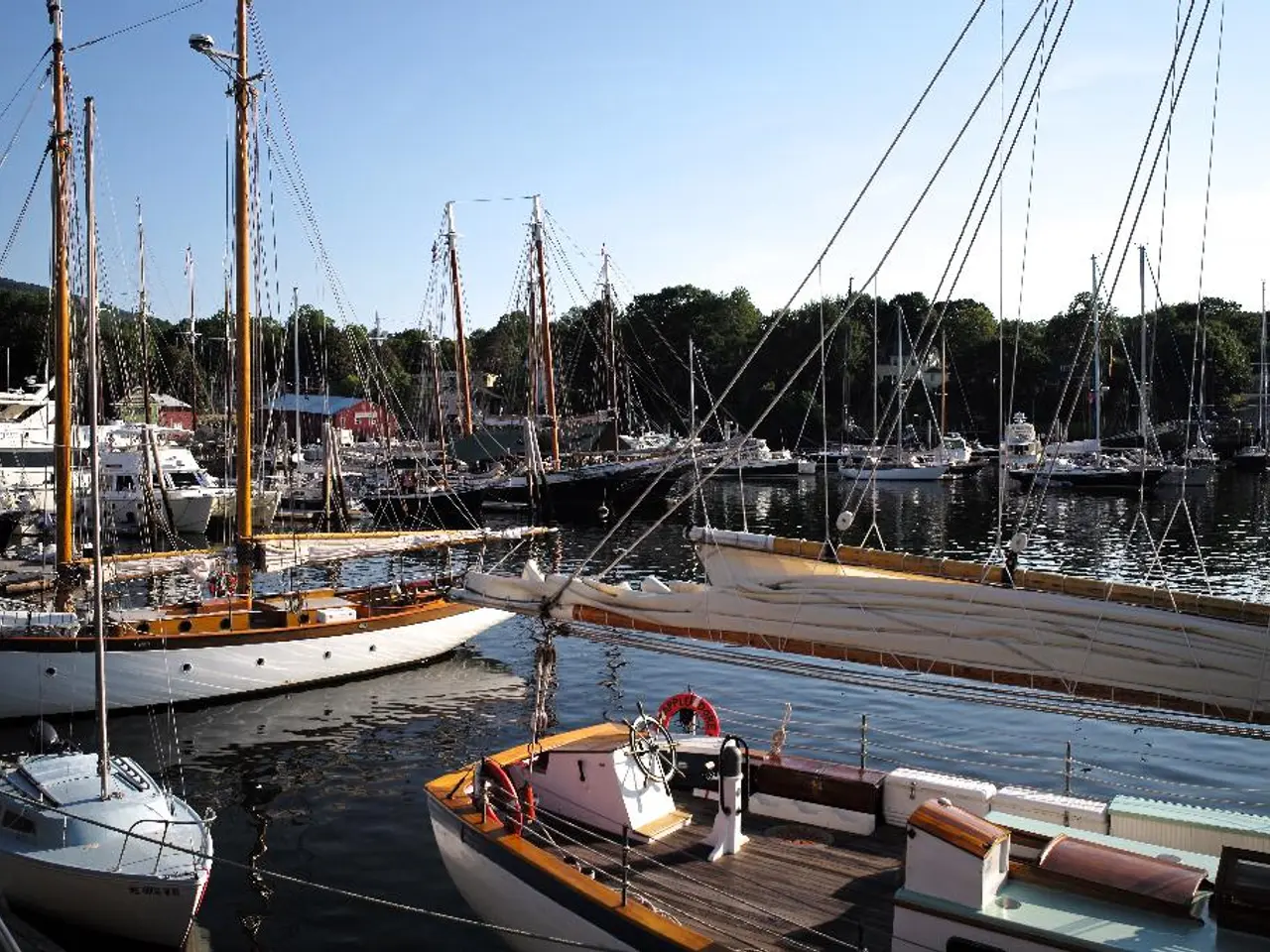Heavily congested shipping yards and ports on the horizon, bracing for an influx of maritime traffic: the scene foreshadows a bustling marine experience.
## Maritime Industry Faces Challenges and Opportunities in Germany
Germany's maritime sector is witnessing a moderate economic upturn for 2025, with a more optimistic outlook in both shipbuilding and port industries compared to late 2024. However, the industry is grappling with significant transformation pressures, particularly with regards to climate neutrality and the modernization of port infrastructure.
### Investment in North German Ports
In an effort to future-proof North German ports, the German government has announced a €400 million investment programme over the next four years. This funding, partly from the EU Emissions Trading System (ETS) and the national Climate and Transformation Fund (KTF), is aimed at climate-friendly modernization of ports and shipping infrastructure. The focus is on the five North German coastal states: Hamburg, Lower Saxony, Bremen, Schleswig-Holstein, and Mecklenburg-Western Pomerania.
The investments will support Germany's commitment to sustainable, resilient maritime infrastructure, with the aim of transforming ports into "energy hubs" that are more integrated into the national energy infrastructure and less dependent on fossil fuels. Some innovative projects include the planned green ammonia import terminal in Hamburg, which could mark a significant step towards decarbonizing maritime logistics.
### Market and Technological Drivers
Parallel to infrastructure investments, the market for advanced seawater pumps—essential for shipbuilding, port operations, and district heating—is projected to grow steadily. From USD 121 million in 2025, this market is expected to reach USD 195.2 million by 2035, driven by demand for corrosion-resistant, energy-efficient systems.
### Challenges and Coordination
The successful implementation of these initiatives requires close collaboration between federal and state governments and the private sector. Despite the government's plans to expedite permitting processes for new projects, bureaucratic hurdles and the scale of investment required may still pose challenges.
### Economic Concerns in the Shipping and Port Industries
While the business climate index in the port industry has significantly improved, rising by 20.4 points to 97.6 points, the situation in the shipping sector is less positive. The business climate index in the shipping sector has decreased by 32.5 points to 76.0 points.
Companies in both industries are concerned about economic framework conditions, with almost all surveyed companies in shipbuilding (99 percent) and 93.0 percent of shipping companies expressing this concern. Over 63 percent of companies in the port industry see foreign demand as an economic risk, and over 55 percent of companies in the port industry see risks in the development of labor costs.
Moreover, the game of uncertainty created by tariffs continues to create medium- to long-term uncertainty for affected companies along global supply chains. Some of the new US tariffs have been temporarily suspended until August 1, but it remains unclear whether and in what form they will be implemented afterwards.
Knud Hansen, chairman of IHK Nord, has demanded at least 15 billion euros from the federal infrastructure fund for North German port infrastructure. He also suggests the federal government should permanently participate in the annual port burdens of the states with at least 500 million euros.
### Addressing the Shortage of Skilled Workers
Around 61 percent of companies in the port industry complain about a shortage of skilled workers, a concern also shared by companies in shipbuilding, where 42.1 percent see the shortage of skilled workers as a significant risk.
In conclusion, Germany's maritime industry is at a pivotal juncture, with a clear focus on future-proofing North German port infrastructure through substantial public investment in climate-neutral technologies and energy hubs. While the economic outlook has improved, the scale of transformation required, coupled with the need for private sector engagement and streamlined permitting, underscores both the opportunities and challenges ahead. The success of these initiatives will be critical for maintaining Germany's competitiveness as a global maritime and logistics hub in a decarbonizing world.
- The German government's €400 million investment program over the next four years aims to modernize ports and shipping infrastructure in a climate-friendly manner, which could potentially open doors for the integration of sustainable sports equipment or facilities within these energy hubs.
- Despite the anticipated growth in the market for advanced seawater pumps that will be crucial for environmental-friendly shipbuilding, port operations, and district heating, the maritime industry is still concerned about economic framework conditions and the shortage of skilled workers, which could also impact sports organizations reliant on these industries for infrastructure and logistics support.








